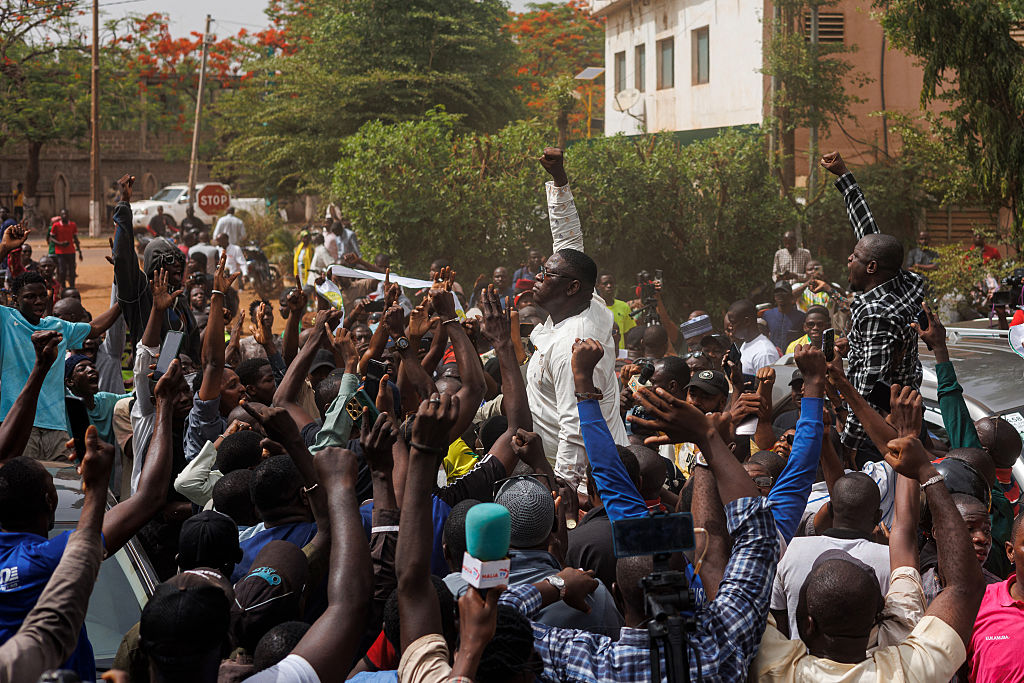Malian journalist Seydou Oumar Traoré on May 26 was arrested for criticizing Guinea’s transitional president, Gen. Mamady Doumbouya, marking a continuing trend of jailing Malian critics of regional juntas.
Traoré, who had just returned from an official mission to Kidal as part of the Malian Minister of Defense’s delegation, claimed in a viral social media video that Doumbouya had “betrayed the Alliance of Sahel States (AES) by collaborating with Western countries to host terrorist bases on Guinean soil.”
Traoré’s trial is scheduled to begin July 10, according to West Africa Democracy Radio. He has apologized to Doumbouya.
His detention marked the second such arrest in Mali since November 2024, when government officials charged political activist Issa Kaou N’Djim, a then-vice president of Mali’s interim parliament, with “subversive remarks” about Burkina Faso’s junta leader, Capt. Ibrahim Traoré, according to the International Freedom of Expression Exchange (IFEX).
In late December 2024, N’Djim was sentenced to two years in prison for defaming a foreign head of state. Analysts said that N’Djim’s case underscored concerns over freedom of expression in Mali, as the conviction of a prominent opposition figure could discourage public discourse and opposition.
Burkina Faso’s media regulator, the Conseil Superieur de la Communication, complained that Malian private television station Joliba TV, which hosted N’Djim, had shamed the Burkinabe government by discrediting a declaration that it had thwarted a coup attempt. Mali’s media regulator, the Higher Authority for Communication, then suspended the station’s license for six months, according to the Media Federation for West Africa.
Critics of Mali’s ruling junta, led by Gen. Assimi Goïta, also face repercussions.
On May 8, two political opposition leaders, Abba Alhassane, secretary-general of the opposition Convergence for the Development of Mali party, and El Bachir Thiam, a leader of the Change party, went missing, IFEX reported. They had participated in May 3 protests in Bamako over the military’s plan to remain in power without holding elections.
Colleagues of Alhassane told Human Rights Watch (HRW) that masked gunmen claiming to be gendarmes arrested him at his Bamako home and took him away in an unmarked car. Unidentified men took Thiam off the streets in Katiu, a town about 15 kilometers from Bamako.
Abdoul Karim Traoré, youth president of the Convergence for the Development of Mali, also attended the May 3 protest. He witnessed Alhassane’s abduction, publicly denounced it and went missing in Bamako on May 11. A Malian security source told Radio France International (RFI) that state security forces were holding him. Pro-democracy leaders said they were staying quiet or hiding to avoid being detained.
“We are fighting with unequal weapons,” a former minister told RFI. “But that in no way alters our determination: for democracy, freedom, and respect for the law.”
Analysts say a return to democracy is unlikely to happen soon. In late April, a national consultation organized by the junta recommended that parties be dissolved and that it be made more difficult to form them. Mali’s National Transition Council on May 13 adopted a bill that abolishes multiparty politics across the country.
“The new law officially bans opposition political meetings, speeches, and organizations,” wrote Lewis Mudge, HRW’s Central Africa director. “The action unfortunately came as no surprise given the ruling military junta’s recent attacks on the political opposition.”
Multiparty politics and freedoms of expression and association were enshrined in Mali’s Constitution of 1992, the year Mali transitioned to a democratic multiparty system. Goïta’s junta had stated it would return to democracy by March 2024.
By enacting the new law, the junta “signed the death certificate of political pluralism in Mali,” former Justice Minister Mamadou Ismaïla Konaté said in reports by France 24 and other outlets. Konaté said the move was “an attempt to systematically demolish political countervailing powers” in Mali.
Goïta’s junta has permanently banned France 24 and RFI, and the junta has suspended French television channel TV5 Monde over its reporting of the May 3 protests, Al-Ahram Online reported. The length of the suspension was unclear. The junta also suspended TV5 Monde for three months in 2024.

